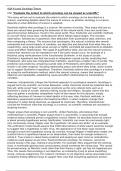AQA A-Level Sociology Theory
(20) “Evaluate the extent to which sociology can be viewed as scientific”
This essay will set out to evaluate the extent to which sociology can be described as a
science, examining debates about the nature of science, as whether sociology is a science
depends on what definition of science is adopted.
Positivists believe that sociology is a science- the science of society. They argue that just as
there are natural laws governing the behaviour of the natural world, there are social laws
governing human behaviour, found in the social world. Thus, Positivists use scientific methods
to uncover these social laws- verificationism which follows logical stages. This includes
observation, followed by a hypothesis, then deduction from quantitative data collection, and
then composing a theory. This ensures that sociologists, like natural scientists who merely
manipulate and record impacts of variables, are objective and detached from what they are
researching- using large scale social surveys or tightly controlled lab experiments to establish
cause-and-effect relationships. The usage of quantitative data, also like the natural sciences,
means that research can be repeated to see if the same results occur. An example of a
Positivist using verificationism is the Functionalist Durkheim, in his study of suicide.
Durkheim’s hypothesis was that low levels on integration caused suicide, predicting that
Protestants, who were less integrated than Catholics, would have a higher rate of suicide. This
prediction was tested by comparing suicide rates of Protestants and Catholics (who were
similar in all other respects- including relationship status and where they lived), which turned
out to support Durkheim’s hypothesis. Therefore, Positivists believe that sociology is a science
by using the verificationism method, which like natural sciences, means that research is
objective and repeatable, establishing cause-and-effect relationships by manipulating
variables.
However, Interpretivists critique the Positivist approach to sociological research. Sociology is
argued not to be scientific, as human behaviour, unlike chemicals cannot be predicted due to
free will, while social “laws” are social constructs as this only collects facts such as in
Durkheim’s study of suicide- statistics linking suicide and religion. Douglas claims that this
does not gather a verstehen (empathetic truth) of the reason for this decision, simply
reflecting decisions of Coroners to label deaths in this way. Also, Positivist methods, in
laboratory experiments produce the Hawthorne Effect- in which subjects change their
behaviour in when being observed, as opposed to chemicals. Therefore, Interpretivists
criticise the Positivist view that sociology is a science, as scientific methods are unsuited to
studying humans.
Popper argues that sociology is not scientific. Unlike Positivists, who believe that
verificationism is scientific, Popper argues that it is unscientific, in assuming that enough
evidence being collected proves a hypothesis correct. Rather, he describes that true science
is about proving hypotheses wrong- falsification. Scientists can never be conclusively right,
only conclusively wrong. Popper uses the hypothesis “all swans are white” as an example.
The verification model would assume that 1000 observations of white swans would be enough
to suggest that a hypothesis is right. Thus, the appearance of one black swan would be
enough to prove this hypothesis wrong. By contrast, through Popper’s falsification model, the
scientist forms a hypothesis based on an observation, then looks for enough evidence to
refute it. True science is about being sceptical and keeping an open mind as contradictory
evidence could appear at any time. Positivist Marxist sociology, for instance, cannot be
proved wrong in this way, making it unscientific. For example, Marx argued that the working-
class, in eventually gaining class consciousness would overthrow the ruling-class. This cannot
be proved wrong, as Marxists could claim that their theory is right- yet has not happened yet.
Thus, this means that sociology is not objective, as constantly trying to prove something
wrong, removes subjectivity. For instance, Feminism is not objective, being value-laden and
constantly finding different ways to support their view that everything oppresses women.




